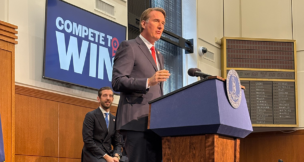Higher ed can (and should) improve Virginia’s tech talent pipeline. Here’s how.
Virginia Business //January 2, 2019//
Higher ed can (and should) improve Virginia’s tech talent pipeline. Here’s how.
Virginia Business //January 2, 2019//
For much of Virginia’s business community, Amazon’s announcement that it had chosen Northern Virginia for one of its two new corporate headquarters was the news event of 2018.
The presence of a highly skilled workforce was one of the factors that tipped the scales in Virginia’s favor. In a statement, Amazon founder and CEO Jeff Bezos called the National Landing site in Arlington a location that “will allow us to attract world-class talent that will help us to continue inventing for customers for years to come.”
As the primary pipeline for Virginia’s labor pool, the commonwealth’s universities played a significant role in the coup of attracting Amazon. Here are some best practices for 2019 that can help us continue to grow and strengthen the tech talent pipeline for all of Virginia’s businesses:
Challenge the divide between “academic” and “workforce development.”
The days of the rarefied ivory tower are over, and this is good news for business and academia. The outmoded view of higher education said universities had to choose between being serious academic institutions or places to prepare students for employment. But the heart of many of academic disciplines — computing, engineering, medicine and business, to name just a few — is in the real world. Our universities are finding innovative ways to convert the priorities of the working world into laboratories for student learning. Computer hackathons and engineering capstone projects, for example, start with companies pitching real problems for students to solve. Students test and expand their mastery of academic content by applying it to the challenges industries face. These applied challenges increase students’ academic knowledge and workplace readiness. In the process, employers meet — and recruit — the next generation of tech innovators.
Make it easier for professionals to gain graduate-level knowledge — and stay in the workforce.
It’s the rare professional who can take a multi-year leave-of-absence to go to graduate school. To stay current in ever-expanding fields, however, workers in critical industries such as computer science and engineering must be able to keep learning from academia’s experts. Higher education has been meeting this need with online education and evening-and-weekend master’s programs. As workplace demand increases throughout high-tech sectors, universities must keep innovating their graduate-level programs for working professionals. Distance-learning master’s programs are a great option, ideally with synchronous, real-time delivery of instruction in demanding computer science and engineering specialties. Post-baccalaureate graduate certificate programs in data science and cybersecurity are another great way to give IT professionals a fast, focused path to credentials in many employers’ most critically needed specialties. Best of all, these programs don’t require IT professionals to leave their jobs to advance their technical expertise.
Let students have a tech specialty without being a tech major.
In the emerging economy, computer science isn’t just for tech workers. It’s for all workers. Many of the 25,000 Virginia-based employees Amazon plans to hire in the next five years will work in non-technical areas, but they, along with workers in Virginia’s other companies, will have to be tech savvy. Our universities have some of the country’s top undergraduate programs in the arts, humanities, sciences, business and medicine. What if students could add a rigorous computer science specialty to their bachelor’s degrees in those disciplines? Programs that give all college students the option to gain fluency in web development, software engineering, data science and cybersecurity will greatly enrich Virginia’s professional talent pool. The designer, communicator, economist or health-care specialist who speaks and understands the “language” of computing instantly adds more value to his or her degree — and future workplace. Higher education has the opportunity to lead the way in making more and more of Virginia’s workforce a high-tech workforce.
The Amazon announcement signaled a new era for the commonwealth’s companies and those who are educating its incoming professionals. But Virginia’s need for home-grown, high-tech employees extends beyond the country’s biggest retailer.
This is the season of new goals, expectations and commitments. Let’s make a bold commitment to join forces between industry and academia and build a talent pool that brings creativity, collaboration and tech expertise to all of Virginia’s workforce.
Barbara D. Boyan, Ph.D., is the Alice T. and William H. Goodwin Dean of the VCU College of Engineering.
i
















